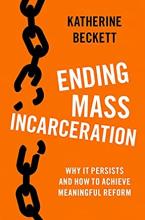More than 2 million people in the United States live behind bars, a scale of punishment and human suffering not seen in any other society—yet US crime rates are at historic lows. In her new book, Ending Mass Incarceration, S. Frank Miyamoto Professor of Sociology Katherine Beckett explains how and why mass incarceration persists despite growing recognition of its many failures, despite plummeting crime rates, and even despite widespread efforts by legislators and activists to reduce prison populations.
The book first identifies forces that sustain high incarceration rates in America, despite some surface-level reforms that are politically palatable but practically-speaking do little to curb key drivers of mass incarceration. Beckett invokes the well-known relationships between trauma, poverty, and crime, which suggest that tough-on-crime measures have done little to address violent crime at its root causes. Over the years, rhetoric and dog whistles have distorted public understanding of so-called reforms that in practice exacerbated poverty and led ultimately to the destruction of communities.
Beckett’s book focuses on the need for a different kind of reform, to both curb mass incarceration and repair its social effects. Beckett argues that the “tough on crime” status quo is a misguided response to larger social issues including addiction, poverty, and trauma. Therefore, a transformative response will have to include policy changes that significantly reduce the scale of punishment. Rather than enacting surface level reforms, true reform would combat the root of the underlying social issues that lead to violent crime, and expand principles of restorative justice to provide a different track toward community accountability. Beckett invites readers to reimagine “public safety” and consider what it might be like to provide for the well-being of entire communities.
Allison Goldberg, a graduate research assistant working closely with Beckett, says, “Katherine's research is also focused on how the criminal legal system manages social marginality, including the ways in which it reproduces and exacerbates structural inequities that disproportionately harm people of color and low-income people.” Lindsey Beach, a PhD student co-author of several papers with Beckett, says her research moves beyond the ‘ivory tower’ and invites readers to see the world through a perspective “rooted in a sober assessment of the current world and grounded in hope for a more just future.”
Growing public interest in criminal justice reform represents a major opportunity to bring about the kinds of changes described in Ending Mass Incarceration. After decades of unsuccessful policies, many Americans may see mass incarceration as an inevitability. Katherine Beckett’s analysis of the criminal justice system shows that nothing about our current system is inevitable.
